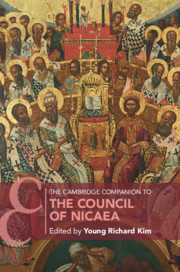Book contents
- The Cambridge Companion to the Council of Nicaea
- Cambridge Companions to Religion
- The Cambridge Companion to the Council of Nicaea
- Copyright page
- Dedication
- Contents
- Figures
- Contributors
- Acknowledgements
- Abbreviations
- 1 Introduction
- Part I Contexts
- Part II The Council
- Part III Outcomes
- Part IV The Aftermath
- Part V The Long Reception
- Appendices
- Bibliography
- Index
- References
1 - Introduction
Published online by Cambridge University Press: 17 December 2020
- The Cambridge Companion to the Council of Nicaea
- Cambridge Companions to Religion
- The Cambridge Companion to the Council of Nicaea
- Copyright page
- Dedication
- Contents
- Figures
- Contributors
- Acknowledgements
- Abbreviations
- 1 Introduction
- Part I Contexts
- Part II The Council
- Part III Outcomes
- Part IV The Aftermath
- Part V The Long Reception
- Appendices
- Bibliography
- Index
- References
Summary
The introduction to this volume begins with a reflection on the impact of Dan Brown’s novel, The Da Vinci Code, especially for its presentation of the Council of Nicaea as a conspiratorial moment in the history of Christianity. It then offers a sweeping examination of how various contemporary Christian traditions and denominations have received the Council of Nicaea and its creed and how they understand historical figures such as Arius and Constantine. As we near the 1,700-year anniversary of the first “ecumenical” council, the chapters in this volume will revisit old debates and discussions, ask new questions, and offer different perspectives on the people, context, and consequences related to the Council of Nicaea.
Keywords
- Type
- Chapter
- Information
- The Cambridge Companion to the Council of Nicaea , pp. 1 - 16Publisher: Cambridge University PressPrint publication year: 2021
References
Select References
- 1
- Cited by

